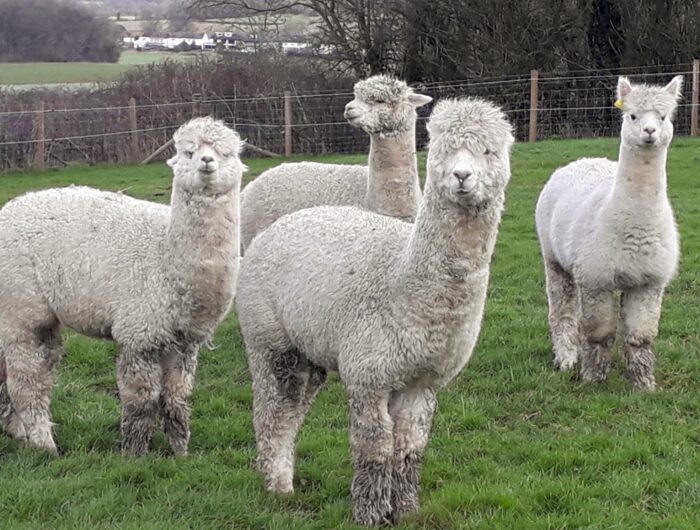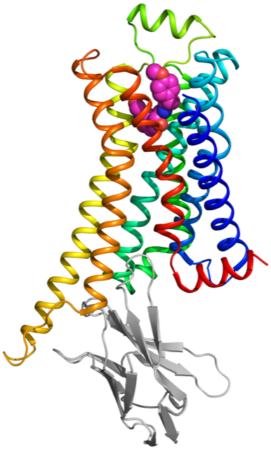The LMB’s alpacas have been inoculated to induce production of antibodies that can be converted into nanobodies for structural studies of complex proteins

Last year the LMB became the proud owners of four alpacas. The animals are housed at the Royal Veterinary College (RVC), where they are cared for alongside a wider herd. They offer huge potential for molecular research as only camelids and sharks naturally produce a special type of antibody from which nanobodies are made.
Nanobodies are small antibody-derived proteins roughly one-tenth the size of human antibodies. Their tiny size makes nanobodies highly stable and capable of binding to challenging proteins, such as receptors that work in oily cell membranes. When binding, nanobodies lock proteins into position, in part due to their small size meaning they fit into the hinges and grooves of complex structures. This allows for greater accuracy for structural determination of proteins that are otherwise impossible to study.

Inoculating the alpacas with specific but harmless proteins causes the animals to produce high-affinity antibodies which target and neutralise the chosen protein. The target-binding portion of some of these antibodies is particularly small and can be separated from the rest of the antibody to make a nanobody. Six weeks after the initial injection (which is just one millilitre in volume), a small blood sample is taken from each alpaca, from which nanobodies are derived and used to determine protein structures. All of the work undertaken is approved with a Home Office Project Licence and the LMB and RVC Animal Welfare and Ethical Review Bodies have reviewed and approved the scientific justifications for the research.
The Head of LMB’s Biological Services Group commented, “The animals receive the best of care at the Royal Veterinary College. They are looked after by fully trained and competent animal technicians and vets. The animals are in the best of health, which is essential for raising any kind of antibody. The alpacas are TB tested before they are allowed on the farm with other large animals.
Currently, the LMB alpacas are being used to generate nanobodies to study filamentous structures behind neurodegenerative diseases, the protein complex mTORC1, which is responsible for activating protein translation, and cell surface receptors that mediate the formation and function of synapses in the vertebrate nervous system.
Each alpaca delivers nanobodies for a maximum of five studies, with a six-month clearing time between them. Once the allowed number of studies have been conducted, the animals will be rehomed.
Royal Veterinary College:
Research involving animals is well regulated in the UK and the Royal Veterinary College has a long-standing commitment to the welfare of animals in research environments. The College also undertakes research to improve the welfare of experimental animals.
The Royal Veterinary College shares society’s desire to minimise the use of animal experimentation, improve the welfare of animals in research and increase the use of scientifically validated alternative methods that reduce, refine or replace the use of animal models and all research proposals are stringently reviewed by the Animal Welfare and Ethical Review Board before submission to the Home Office.
As a leading provider of both first opinion and referral veterinary treatment, the RVC delivers the best of care to those animals participating in research programmes. High standards of animal housing, husbandry, care and socialisation are provided throughout research programmes to ensure high quality animal welfare by a team of passionate and dedicated animal care staff and researchers. The RVC is dedicated to the rehoming of animals after participation in research programmes if this is in the best interests of the animal.
Animal-based research taking place at the RVC helps educate both undergraduate and postgraduate students in robust scientific methodologies and enables courses to be grounded in the most up-to-date knowledge.
Further references